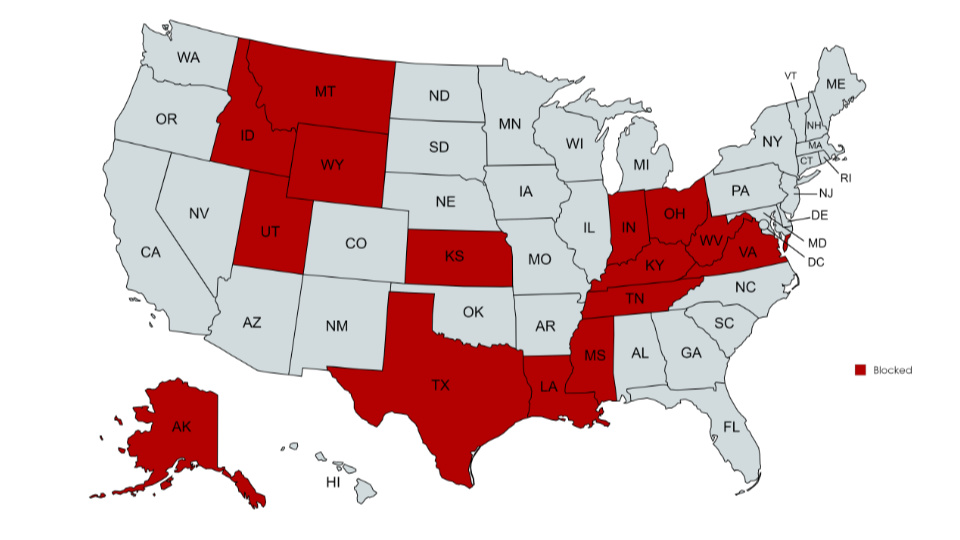The Biden administration’s Title IX regulations, which roll back due process for accused students and require schools to adopt new policies on gender identity, have been repeatedly slammed in court decision after court decision. These include three new injunctions since our update two weeks ago. Two of them were issued yesterday.
We are now up to five injunctions that block the regs in at least fifteen states: Alaska, Idaho, Indiana, Kansas, Kentucky, Louisiana, Mississippi, Montana, Ohio, Tennessee, Texas (new as of July 11), Utah, Virginia, West Virginia and Wyoming. Unless there are more injunctions, the regulations will go into effect in the rest of the states on August 1.
Here are the injunctions:
- State of Texas v. USA, issued July 11 by Judge Matthew Kacsmaryk. This decision bars the regulations from going into effect in Texas. No appeals or requests for a stay pending the resolution of an appeal yet, but it is almost certain the Biden administration will seek them.
- Carroll ISD v. U.S. Dept. of Ed, issued July 11 by Judge Reed O’Connor. This decision is limited to one school district in Texas—for now; Judge O’Connor has requested briefing from the parties regarding a nationwide injunction. Here as well, no appeals or requests for a stay yet.
- State of Kansas v. U.S. Dept. of Ed, issued July 2 by Judge John Broomes in U.S. District Court for the District of Kansas. This injunction bars the regulations from going into effect in KS, AK, UT, and WY. The Biden administration has appealed the decision to the Tenth Circuit and has moved to stay the injunction in district court while the appeal moves forward; no decision on that yet. The appeal is still just getting off the ground.
- State of Tennessee v. Miguel Cardona et al, issued June 17 by Judge Danny Reeves in U.S. District Court for the Eastern District of Kentucky. This order is limited to TN, KY, OH, IN, VA, and WV. The Biden administration has appealed the injunction to the Sixth Circuit, but its request for a stay of the injunctions pending the resolution of the appeal was denied in district court on July 10. The Sixth Circuit has asked for the parties to brief the court on whether the regs should continue to be enjoined in full or in part in the states covered by the district court injunction.
- State of Louisiana v. U.S. Dept. of Ed, issued June 13 by Judge Terry Doughty in U.S. District Court for the District of Louisiana. This order affects the states of LA, MS, MT, and ID. Judge Doughty has denied the Biden administration’s request to stay the injunction until its appeal is resolved in the Fifth Circuit.
Thoughts on the Appeals
The plaintiffs appear to have picked their venues well; the Biden administration faces stern battles in the Fifth, Sixth, and Tenth Circuits. The Fifth Circuit is notoriously conservative. The Sixth Circuit gave us Doe v. Baum, a landmark opinion authored my Judge Amul Thapar (who authored a similar decision in Doe v. University of Cincinnati) that required full hearings and cross-examination. It would be interesting to read his opinion if he is also assigned to the appeal in State of TN v. Miguel Cardona et al (no judicial assignments have been made on appeal yet).
These appeals will not be fully resolved by August 1 when the regulations go into effect. It is possible that more injunctions can be issued before then. Additionally, on June 28 the Supreme Court overturned Chevron, so that will no longer be an arrow in the Biden administration’s quiver on appeal or in further district court decisions, if it ever really was.
For those unfamiliar: “Chevron deference” required courts to defer to administrative agencies’ interpretation of laws when statutes were unclear. This doctrine gave significant power to these agencies. The Biden administration sought to redefine sex discrimination to include gender identity discrimination, so it invoked Chevron in district court. The judges in the June 13 and June 17 injunctions needed to justify why they did not run afoul of Chevron deference, so you will see those explanations there, but any discussion of Chevron has vanished in the July injunctions.
Thoughts on Strategy and the Future
Ironically, most of the complaints and injunctions against the Biden regs address gender identity/trans issues, arbitrary and capricious rulemaking, and whether the Department of Education exceeded its authority, while due process matters take more of a back seat. And yet, in fifteen states and perhaps more soon, injunctions now block the regs’ anti-due process provisions from going into effect because the Biden administration pushed both as a package deal. United they stand, united they fall.
Discussions of literature often involve critical character flaws that bring about the downfall of a tremendous endeavor or a person. Achilles’ wrath, Odysseus’ Pride, and Macbeth’s over-ambition are notable examples. For Progressives, the flaw that tends to bring down their endeavors (and is currently bringing down years of their Title IX work) is that, in their attempts to appease every group they believe to be marginalized, they tend to attach more liabilities and pain points to their work than are practical in the moment. Incrementalism is a hard ask for sexual revolutionaries.
If the Biden administration’s Title IX rulemaking had only attempted to strip away due process, it might have a more defensible position. It instead pushed its luck by attempting to redefine sex itself, an ambition even Chevron deference (while it lasted) could not defend. This strategy now imperils the rest of their regulatory efforts and provides a buffer or shield of sorts for the due process provisions of the Trump-era Title IX regulations to remain in effect.
We will have more updates in the coming weeks. August approaches, and the time is short.
Thank You for Reading
If you like what you have read, feel free to sign up for our newsletter here:
About the Author
Related Posts
The Biden administration’s Title IX regulations, which roll back due process for accused students and require schools to adopt new policies on gender identity, have been repeatedly slammed in court decision after court decision. These include three new injunctions since our update two weeks ago. Two of them were issued yesterday.
We are now up to five injunctions that block the regs in at least fifteen states: Alaska, Idaho, Indiana, Kansas, Kentucky, Louisiana, Mississippi, Montana, Ohio, Tennessee, Texas (new as of July 11), Utah, Virginia, West Virginia and Wyoming. Unless there are more injunctions, the regulations will go into effect in the rest of the states on August 1.
Here are the injunctions:
- State of Texas v. USA, issued July 11 by Judge Matthew Kacsmaryk. This decision bars the regulations from going into effect in Texas. No appeals or requests for a stay pending the resolution of an appeal yet, but it is almost certain the Biden administration will seek them.
- Carroll ISD v. U.S. Dept. of Ed, issued July 11 by Judge Reed O’Connor. This decision is limited to one school district in Texas—for now; Judge O’Connor has requested briefing from the parties regarding a nationwide injunction. Here as well, no appeals or requests for a stay yet.
- State of Kansas v. U.S. Dept. of Ed, issued July 2 by Judge John Broomes in U.S. District Court for the District of Kansas. This injunction bars the regulations from going into effect in KS, AK, UT, and WY. The Biden administration has appealed the decision to the Tenth Circuit and has moved to stay the injunction in district court while the appeal moves forward; no decision on that yet. The appeal is still just getting off the ground.
- State of Tennessee v. Miguel Cardona et al, issued June 17 by Judge Danny Reeves in U.S. District Court for the Eastern District of Kentucky. This order is limited to TN, KY, OH, IN, VA, and WV. The Biden administration has appealed the injunction to the Sixth Circuit, but its request for a stay of the injunctions pending the resolution of the appeal was denied in district court on July 10. The Sixth Circuit has asked for the parties to brief the court on whether the regs should continue to be enjoined in full or in part in the states covered by the district court injunction.
- State of Louisiana v. U.S. Dept. of Ed, issued June 13 by Judge Terry Doughty in U.S. District Court for the District of Louisiana. This order affects the states of LA, MS, MT, and ID. Judge Doughty has denied the Biden administration’s request to stay the injunction until its appeal is resolved in the Fifth Circuit.
Thoughts on the Appeals
The plaintiffs appear to have picked their venues well; the Biden administration faces stern battles in the Fifth, Sixth, and Tenth Circuits. The Fifth Circuit is notoriously conservative. The Sixth Circuit gave us Doe v. Baum, a landmark opinion authored my Judge Amul Thapar (who authored a similar decision in Doe v. University of Cincinnati) that required full hearings and cross-examination. It would be interesting to read his opinion if he is also assigned to the appeal in State of TN v. Miguel Cardona et al (no judicial assignments have been made on appeal yet).
These appeals will not be fully resolved by August 1 when the regulations go into effect. It is possible that more injunctions can be issued before then. Additionally, on June 28 the Supreme Court overturned Chevron, so that will no longer be an arrow in the Biden administration’s quiver on appeal or in further district court decisions, if it ever really was.
For those unfamiliar: “Chevron deference” required courts to defer to administrative agencies’ interpretation of laws when statutes were unclear. This doctrine gave significant power to these agencies. The Biden administration sought to redefine sex discrimination to include gender identity discrimination, so it invoked Chevron in district court. The judges in the June 13 and June 17 injunctions needed to justify why they did not run afoul of Chevron deference, so you will see those explanations there, but any discussion of Chevron has vanished in the July injunctions.
Thoughts on Strategy and the Future
Ironically, most of the complaints and injunctions against the Biden regs address gender identity/trans issues, arbitrary and capricious rulemaking, and whether the Department of Education exceeded its authority, while due process matters take more of a back seat. And yet, in fifteen states and perhaps more soon, injunctions now block the regs’ anti-due process provisions from going into effect because the Biden administration pushed both as a package deal. United they stand, united they fall.
Discussions of literature often involve critical character flaws that bring about the downfall of a tremendous endeavor or a person. Achilles’ wrath, Odysseus’ Pride, and Macbeth’s over-ambition are notable examples. For Progressives, the flaw that tends to bring down their endeavors (and is currently bringing down years of their Title IX work) is that, in their attempts to appease every group they believe to be marginalized, they tend to attach more liabilities and pain points to their work than are practical in the moment. Incrementalism is a hard ask for sexual revolutionaries.
If the Biden administration’s Title IX rulemaking had only attempted to strip away due process, it might have a more defensible position. It instead pushed its luck by attempting to redefine sex itself, an ambition even Chevron deference (while it lasted) could not defend. This strategy now imperils the rest of their regulatory efforts and provides a buffer or shield of sorts for the due process provisions of the Trump-era Title IX regulations to remain in effect.
We will have more updates in the coming weeks. August approaches, and the time is short.
Thank You for Reading
If you like what you have read, feel free to sign up for our newsletter here:
About the Author
Related Posts
More from Title IX for All
Accused Students Database
Research due process and similar lawsuits by students accused of Title IX violations (sexual assault, harassment, dating violence, stalking, etc.) in higher education.
OCR Resolutions Database
Research resolved Title IX investigations of K-12 and postsecondary institutions by the Department of Education’s Office for Civil Rights (OCR).
Attorneys Directory
A basic directory for looking up Title IX attorneys, most of whom have represented parties in litigation by accused students.







